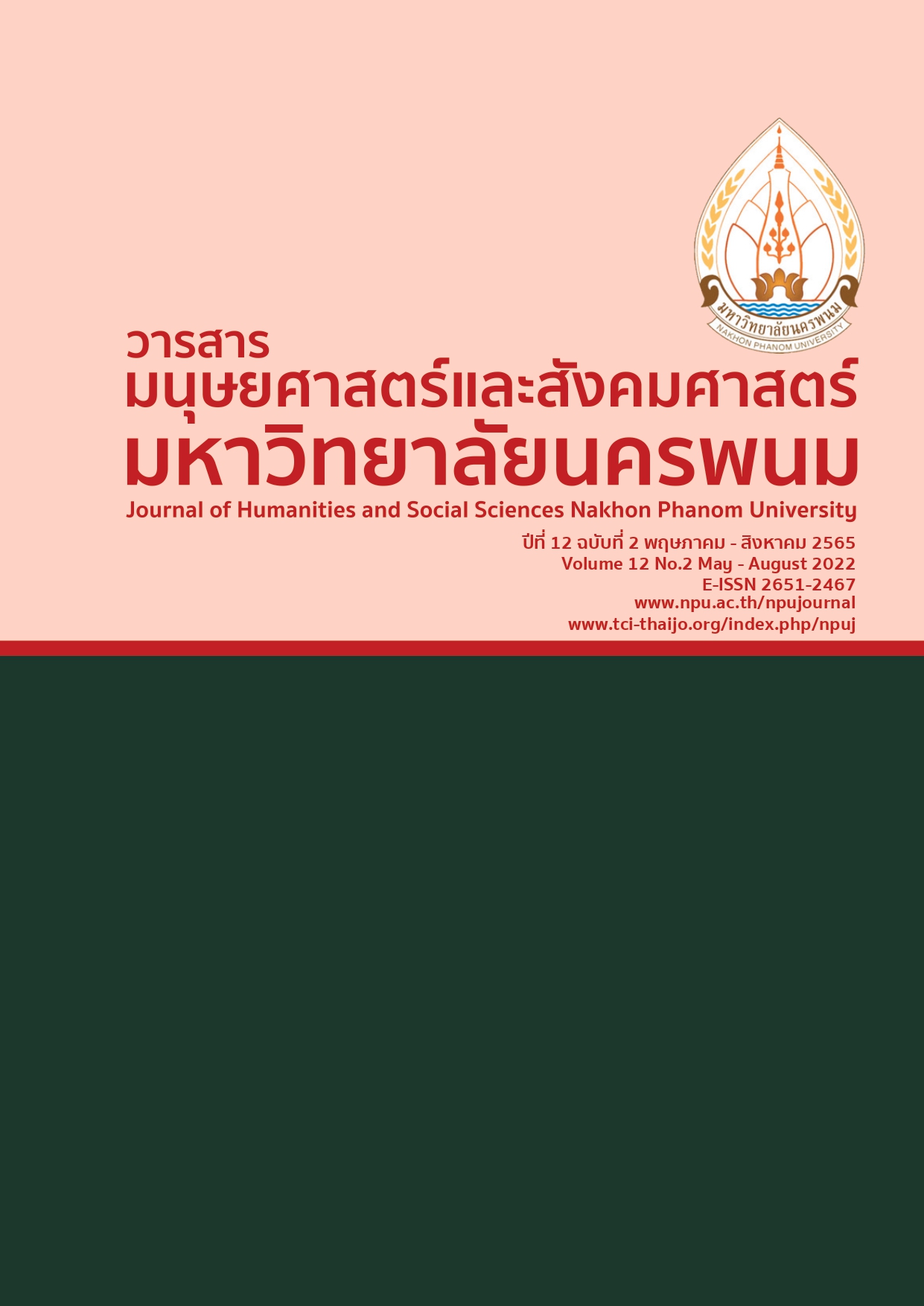The Influence of Psychological Capital, Job Characteristics, and Social Intelligence on Organizational Citizenship Behaviors of Employees in a Food and Beverage Manufacturing Company in Nakhon Pathom Province
Main Article Content
Abstract
The objectives of this research were to study the level of psychological capital, job characteristics, social intelligence, and organizational citizenship behaviors of employees in a food and beverage manufacturing company in Nakhon Pathom province, and to study the influence of psychological capital, job characteristics, and social intelligence on organizational citizenship behaviors of employees in a food and beverage manufacturing company in Nakhon Pathom province. The sample consisted of 225 employees in a food and beverage manufacturing company in Nakhon Pathom province. A research instrument was a questionnaire with a reliability between .80-.96. The percentage, mean, standard deviation, and stepwise multiple regression analysis were employed to analyze the data. The research findings found that 1) the level of overall psychological capital, job characteristics, and organizational citizenship behaviors of employees in a food and beverage manufacturing company in Nakhon Pathom province were at a high level with the average of 3.62, 3.45 and 3.56, respectively, for the level of overall social intelligence of employees in a food and beverage manufacturing company in Nakhon Pathom province was at a moderate level with a mean of 3.35, 2) social intelligence, social skill, job characteristics in task identity, and psychological capital could jointly predict overall organizational citizenship behaviors of the sample at 62 % (R2adj = .62) of the variation with a statistical significance level of .01. The findings of this research would be beneficial as the guideline for promoting and supporting various factors to progressively develop organizational citizenship behaviors of employees.
Article Details

This work is licensed under a Creative Commons Attribution-NonCommercial-NoDerivatives 4.0 International License.
References
Aderibigbe, J. K., and Mjoli, T. Q. (2018). Evaluation of The Components of Psychological Capital and Organizational Citizenship Behavior Among Nigerian Graduate Employees. Journal of Economics and Behavioral Studies. 10(5),38-50. doi:https://doi.org/10.22610/jebs.v10i5(J).2496
Adil, M., Haroon, M., Zakar, M., Shah, J. M. and Tahir, M. (2019). The Effect of Job Characteristic on Employee’s Organizational Citizenship Behavior Among Banking Sector Employees in Peshawar City. International Journal of Management & Entrepreneurship Research. 1(3),132-139. doi: https://doi.org/10.51594/ijmer.v1i3.18
Chamisa, S. F., Mjoli, T. Q., and Mhlanga, T. S. (2020). Psychological Capital and Organizational Citizenship Behaviour in Selected Public Hospitals in The Eastern Cape Province of South Africa. SA Journal of Human Resource Management. 18(0),1-12. doi:10.4102/sajhrm.v18i0.1247
Ghazi, M. (2017). The Effects of Organizational Justice and Job Motivation on Organizational Citizenship Behavior and Its Impact on Taxpayers. 19(2017),39-58. Retrieved June 16, 2020, from https://www. redalyc. org/jatsRepo/5346/534655933003/534655933003.pdf.
Glass, G. V., and Hopkins, K. D. (1984). Statistical Methods in Education and Psychology. 2nd ed. London: Allyn and Bacon.
Gupta, M., Shaheen, M., and Reddy, P. K. (2017). Impact of Psychological Capital on Organizational Citizenship Behavior: Mediation by Work Engagement. Journal of Management Development. 36(7),973-983. doi:10.1108/JMD-06-2016-0084
Hackman, R. J., and Oldham, R. G. (1980). Work Redesign. Reading, Massachusetts: Addison-Wesley.
Harinpolsiti, S., Srisawat, P and Voracharoensri, S. (2018). Kānsœ̄msāngthunthāngčhitwitthayāchœ̄ngbūak khō̜ngnakrīanʻāchīwasưksā Dōikānhaikhamprưksāklumnǣotritdī Hētphon Arrom Phrưttikam [The Enhancement of Positive Psychology Capital of Vocational Studentsthrough Rational Emotive Behaviorgroup Counseling]. 12(1),56-73. Retrieved June 16, 2020, from https://core.ac.uk/download/
pdf/228516707.pdf.
Kintarak, S. (2018). Tonthun thāng čhittawitthayā : khwāmpenmā ʻongprakō̜p læ kānprayukchai”. [Psychological Capital: Background, Components, and Application]. Journal of Clinical Psychology. 49(2),55-69.
Komchadluek, (2019). Thīʻembīsœ̄mkrǣngkhwāmrūʻētʻemʻīthurakitʻāhānlækhrư̄angdư̄m [TMB Strengthens Knowledge of SMEs in Food and Beverage Business]. Retrieved June 2019, from https://www. komchadluek.net/news/economic/380733
Luthans, F., Youssef, C. M., and Avolio, B. J. (2007). Psychological Capital: Developing The Human Competitive Edge. New York: Oxford University Press.
Luthans, F., Youssef-Morgan, C. M., and Avolio, B. J. (2015). Psychological Capital and Beyond. New York: Oxford University Press.
Luthans, F., and Youssef-Morgan, C. M. (2017). Psychological Capital: An Evidence-Based Positive Approach.
Annual Review of Organization Psychology and Organization Behavior. 4,339-366. doi:https://doi.org/
1146/annurev-orgpsych-032516-113324
Mirsafian H. (2018). Effect of Social Intelligence on OCB and EB, with Effect on Social Capital as A Mediating Variable, in A Sport Organization in Iran. Physical Culture and Sport. Studies and Research. 5020(52),34-40. doi:10.2478/pcssr-2018-0003
Organ, D. W. (1998). Organizational Citizenship Behavior: The Good Soldier Syndrome. Lexington, MA: Lexington Books.
Oshi, J. E. O., Akaibe, M. V., and Chikwe, J. O. (2021). Social Intelligence and Organizational Citizenship
Behaviour of Government Parastatals in Nigeria. Nobel International Journal of Social Sciences Research. 6(1),7-17. doi:https://doi.org/10.51550/nijssr.61.7.17
Prasith-Rathsint, S. (2005). Theknik kān wikhro̜ tūaprǣ lāi tūa samrap kānwičhai thāng sangkhommasāt læ phrưttikam sāt. [Multiple Variable Analysis Techniques for Social Science Research and The Behavior Science]. 5th ed. Bangkok: 3 Lada limited Partnership.
Rahim, A. M., Civelek, I., and Liang, F. (2018). A Process Model of Social intelligence and Problem-Solving Style for Conflict Management. International Journal of Conflict Management. 29(4),487-499. doi:https://doi.org/10.1108/IJCMA-06-2017-0055
Robbins, S. P., and Judge, T. A. (2009). Organization Behavior. 13 th ed. New Jersey: Pearson Education.
Sevikul, S. Ratakorn, A., and Promsri. C. (2019). Khwām chalāt thāng sangkhom khwāmphưngphō̜čhai nai kānthamngān læ phrưttikam kān pen samāchik thī dī khō̜ng ʻongkān khō̜ng bukkhalākō̜n thanākhān khō̜ng rat nai Krung Thēp Mahā Nakhō̜n [Social Intelligence, Job Satisfaction and Organization Citizenship Behavior of Government Bank Staff in Bangkok]. Ph.D. in Social Sciences Journal. 9(3),660-674. doi:10.14456/phdssj.2019.47
Silpcharu, T. (2008). Kānwičhai læ wikhro̜khō̜mūn thāng sathiti dūai SPSS [Research and Statistical Analysis as Well SPSS]. 7 th ed. Bangkok: V Inter Print CO., LTD.
Taber, K. S. (2018). The Use of Cronbach’s Alpha When Developing and Reporting Research Instruments in Science Education. Research in Science Education. Research in Science Education. Retrieved July 2020, from https://link.springer.com/content/pdf/10.1007/s11165-016-9602-2.pdf.
Yildiz, H. (2019). The Interactive Effect of Positive Psychological Capital and Organizational Trust on Organizational Citizenship Behavior. SAGE Journals. July-September (2019), 1-15. Retrieved February, 2020 from https://journals.sagepub.com/doi/pdf/10.1177/2158244019862661. https://doi.org/10.117
/2158244019862661


